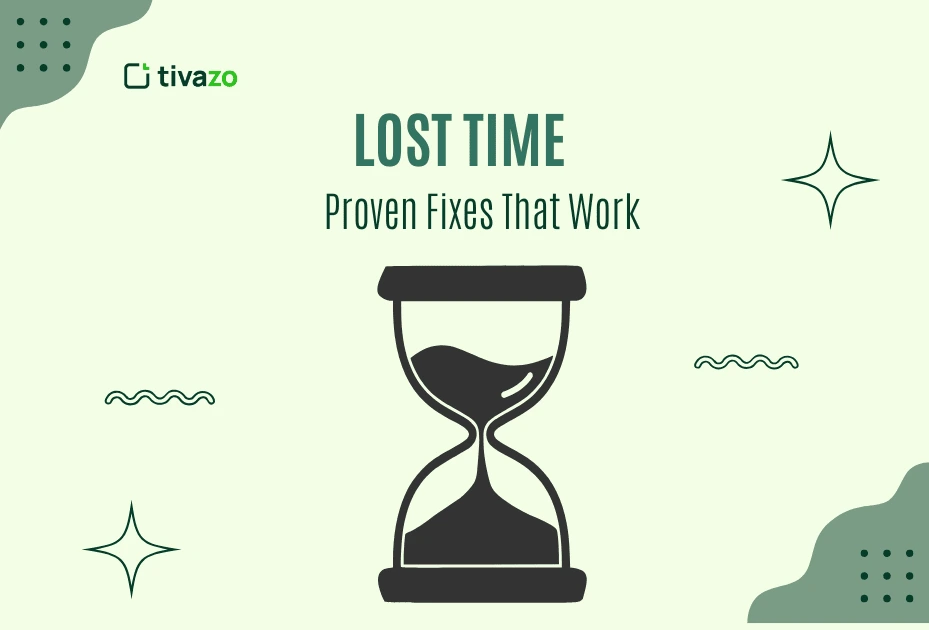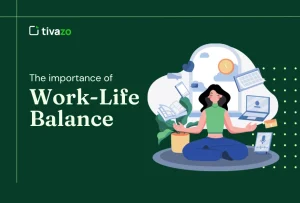You crack open your laptop and wonder what happened to the last three hours?
You were there, physically. Your inbox was open. Slack buzzed. Tabs flashed with notifications. And yet somehow, absolutely nothing transpired.
That is what we call wasted time — and it is silently siphoning your energy, sabotaging your career, and robbing you of the peace of mind you deserve.
In this guide, I’ll show you the legitimate, actionable ways to regain that time and rebuild focus. No fluff. Just fixes that work.
Key Highlights:
- What is the meaning of Lost Time
- How can I recover lost time
- Tools That Help You Recover Lost Time
- How to Make These Fixes Stick
- How Tivazo Helps You Recover Lost Time
What is the meaning of lost time?
Lost time refers to the portion of working hours that are not truly productive, diminishing productivity, deferring objectives, and increasing stress.
You believed you were working, but you weren’t.
Common examples:
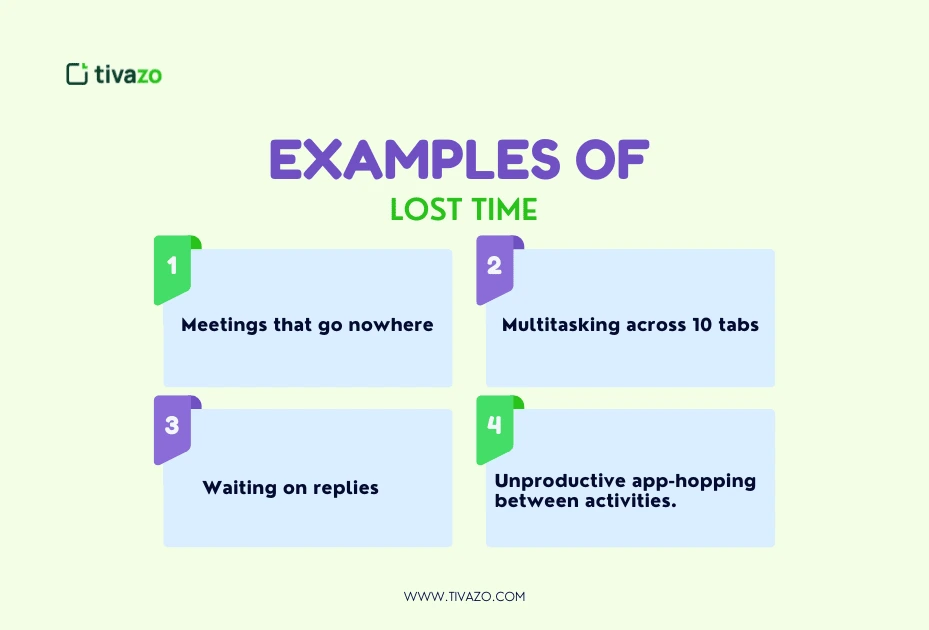
- Meetings that go nowhere
- Multitasking across 10 tabs
- Waiting on replies
- Unproductive app-hopping between activities.
It’s not your fault, not always, but it is your responsibility to take it back.
What are the lost time expenses?
But lost time doesn’t just squander minutes, it eats away your productivity and your well-being. Emotionally, it can lead to ongoing guilt, feelings of burnout, and the exasperating sense of being busy but unaccomplished. Economically, lost time equals missed deadlines, lost bonuses, and lower client revenues. For teams, it results in frustration, rework, distrust, undermining performance, and morale.
How to Know If You’re Losing Time (Self-Test)
Answer honestly:
- Do you find yourself busy all day but not getting much done?
- Are meetings frequently called to no result?
- Do you spend a lot of time tabbing or tool switching?
- Do you find your mind is fried by 2 p.m.?
- Do you get more and more sidetracked by easy tasks?
If you answered “yes” to at least 2 of the above, wasted time is hurting your progress more than you think.
How can I recover lost time
5 Proven Fixes for Lost Time are:
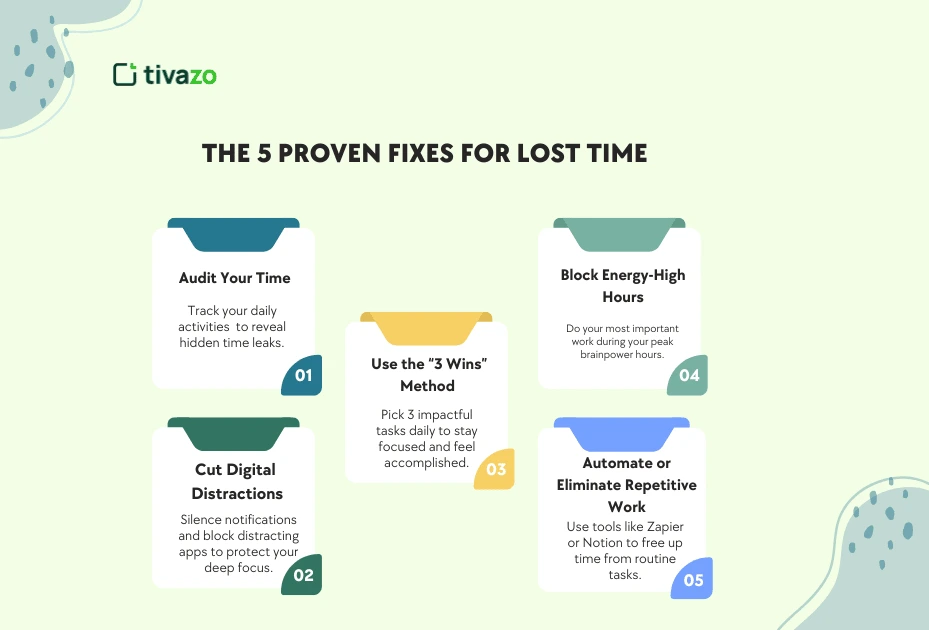
Fix 1: Audit Where Your Time Is Going
“Before you’re able to regain time that’s lost, you need to understand where you’re losing it.” Pull the trigger with time log tracking your daily activities automatically, or do it with your quick and dirty pen sketches. These are tools that show you a visual representation of how many minutes you spend on email, on meetings, on your break, or on distractions. Once you’re face to face with your patterns, you can locate hidden pockets of lost time you spend an hour cleaning out email or checking Twitter every four minutes, maybe — and make better decisions.
Tip: You can’t fix what you can’t see. Tracking creates awareness, which is the first step toward change.
Fix 2: Cut Down Digital Distractions Ruthlessly
Digital distractions are the silent burglars of your focus. Slack pings, emails, social dings, and incessant tab switching shatter your focus and compound lost time. Seize control by turning off notifications when you want or need deep focus. Turn off your phone or leave it in another room.
Consider employing focus apps like Forest, Freedom, or Cold Turkey to block distracting websites or apps during work hours. Making a distraction-free workplace can help keep you fully present and get things done quickly.
Fix 3: Use the “3 Wins” Daily Planning System
A cacophonous to-do list can drive you crazy and sap your energy. Instead, identify just three meaningful tasks in the morning in which to get a win (your “3 Wins”) and that will have the greatest impact by the end of the day. This targeted focus helps you avoid distractions, prevent burnout, and achieve a sense of accomplishment. Write down these 3 wins and have them visible for you to lead your day. Focus on quality, not quantity, and consider these victories as true progress.
Fix 4: Block Your Energy-High Hours First
We all have parts of the day when our brain is at its best, our alert and “sharp” time, usually the morning. Understand your energy. Schedule your hardest/most creative work in your own peak energy time. No meetings or superficial tasks should be scheduled during this time. When you work around the flow of your energy, you will have greater focus, make fewer errors , and complete higher-value projects more quickly.
Fix 5: Automate or Eliminate Repetitive Work
Repetitive work, things like data entry, scheduling, or generating reports, can consume hours of your week. Search for ways to automate all this using tools like Zapier to link software, Notion templates to standardize processes, or detailed SOPs to hand off or speed up the mundane. When you eliminate or automate these time sucks, you’ll be able to focus on strategic initiatives that move the needle.
Why Most People Never Fix Lost Time
Correcting lost time is not just about telling you what to do; it’s also about confronting the changes that go along with it. The reason many people are averse to change is that they perceive it to be uncomfortable or uncertain. It’s easier to stay caught up in busywork than to take a break and reconsider how you allocate your time. This “busyness” frequently deceives us into believing we’re being productive, when in fact we’re not advancing things that really matter.
Another major barrier is the absence of systems or tools that support effective time management. Without any kind of system to monitor your behavior and block distractions, it’s easy to fall back into old habits. The issue is not you; it is the lack of a concrete habit and proper support. This creates cognitive load.
Just remember: You are not lazy or broken. You’re a competent person in a complex world filled with diversions.
The Mindset Shift: Time Is Your Greatest Currency
Your most valuable currency is not money; it is time — time spent learning, loving, being happy, and healthy. Yes, you can earn more money, but these hours you lose slipping through your fingers, well, you lose them forever. That’s why it’s so crucial to stop and ask yourself: What are your hours getting you? Do they help your growth, your happiness, or just keep you busy? Every minute you take back from distraction or a made-up task is a small win.
A silent revolt against burnout and the fog of physical and mental fatigue. Once you begin to treat time in the manner of a precious resource and begin to protect it and use it wisely, you gradually construct a life that feels more meaningful and under your control.
Tools That Help You Recover Lost Time
- Tivazo – tracks time, flags distractions, and boosts team focus
- RescueTime – insights into attention
- Clockify – easy manual/auto time tracking
- Notion – centralized planning
- Focusmate – human accountability
How to Make These Fixes Stick (Permanently)
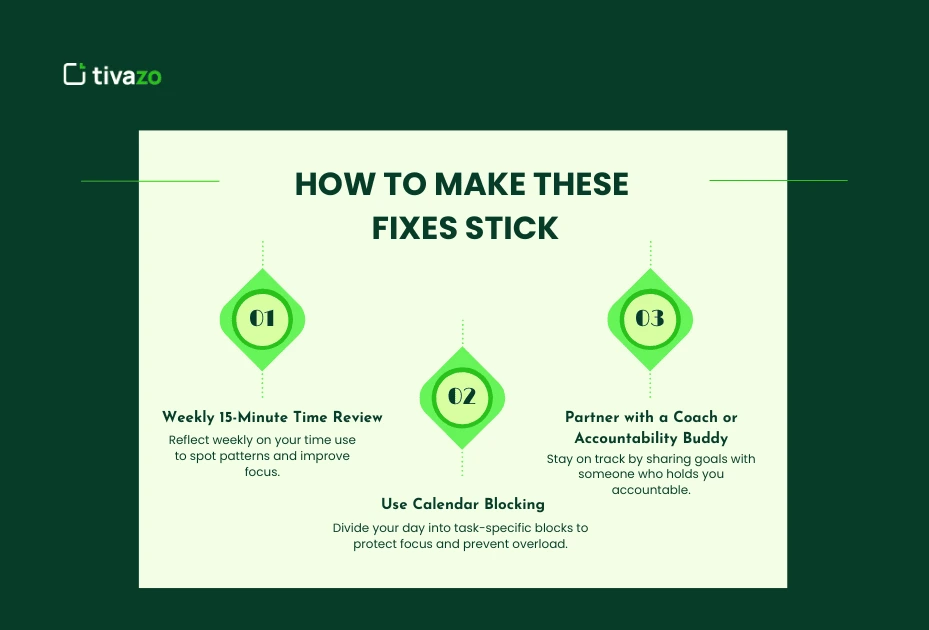
- Weekly 15-Minute Time Review
Just spend 15 minutes, once a week, looking over how you used the hours you had at your disposal. Recognize patterns, cut through distractions, and celebrate tiny wins. It trains you to remain vigilant and adapt your approach before bad habits creep back in. - Use Calendar Blocking
Chunk your day into focused blocks of time for specific tasks or types of work. Instead, visual time blocking limits overbooking by showing you exactly when deep work, meetings, breaks, and planning will (and won’t) happen — and saves your best hours for your most important work. This is calendar blocking. - Partner with a Coach or Accountability Buddy
Share your goals with someone who checks in. That provides encouragement, accountability, and a touch of a forcing function to keep on the path. The best-practice advice to the rest of us is to find a Valentine for our new project or behavior. (I just like to get as many dates out of Valentine’s Day as I can.) And here’s why, or, more specifically, how: It’s easier to develop good habits for the long haul when someone else is in your corner, pushing you toward your goal.
Remember: 10 minutes saved daily = 60+ hours a year.
How Lost Time Creeps into Remote Work
But in remote teams, wasted time tends to be hiding in plain sight, camouflaged by flexible schedules and the absence of a physical workspace. Absent exact scaffolding and visibility, idle time can unknowingly creep in as they juggle interruptions, uncertain priorities, or poorly meshed processes. Lack of immediate supervision means there’s a little more slippage of time isn’t directly moved from A to B.
This is where intentional tools come into play when you’re transparent about what you spend time on, for example, or have daily check-ins to answer to (and communicate with your team in the process!). Combined, these strategies shine a light on wasted time, so that remote teams can take back control of their time and focus on impactful efficiency.
The Role of Leadership in Preventing Lost Time
Time-and-focus culture is also something that leadership can significantly influence. Such managers can establish a friendly work culture in which team members are encouraged to do their best work without constant interruptions, as it allows them the space to prioritize deep work, set clear boundaries for meeting times, and model disciplined habits.
Get people to do asynchronous work, to be thoughtful in how we communicate, rather than being real-time. Monitor the deep work opportunity. The recognition to celebrate results over availability is a strong signal that quality matters more than being “busy.” With trust, clarity, and respect for individual work rhythms, leaders can cut down on wasted time and significantly improve overall team performance.
How Tivazo Helps You Recover Lost Time
Tivazo was created to provide you with clear, actionable insight about where time goes, so you can be more mindful and prioritise how you use it. Its automatic work pattern and distraction tracking features enable people and their teams to be empowered to own their day and focus on what truly matters.
Real-Time Dashboard:
Gives you real-time visibility on what the team is up to so you can tackle inefficiencies on the spot.
Timesheet Management:
Allows you to pin down work hours, breaks, and time spent on different tasks, giving you accurate performance reports.
Idle Time Detection:
Automatically identifies periods of inactivity, prompting users to stay engaged and productive.
Activity Monitoring:
Monitors application usage and screen use, offering insight into how time is spent in various activities.
Comprehensive Reporting:
It can produce detailed reports about team productivity to help recognize areas that must be improved, and in turn, minimize wastage in workflows.
Conclusion + Call to Action
Lost time is a quiet thief. It doesn’t scream or declare itself, but it gradually takes bites of chunks of your momentum, vitality, and joy. Every minute you squander trickles into a collective pool of time wasted, making you feel the burden of being behind, overworked, and burned out without knowing exactly why.
The good news? You’re not broken — you just need better systems and habits to regain control. By noticing how you are spending your time and making small, targeted adjustments that reduce or eliminate less productive uses of your time, you can stop wasting precious hours a day.
Begin now: Log your time for just one day. You’ll be surprised at what you find — and how much of your life you can get back just by paying attention.
Then take back those minutes; they have always been yours.
👉 If you found this helpful, please share it. Bookmark it. Come back to it
FAQs
What is considered lost time?
Lost time includes any unproductive moments during work hours, such as distractions, waiting, multitasking inefficiencies, or delays.
How to make up for lost time?
Make up lost time by prioritizing tasks, eliminating distractions, improving focus, and using time management techniques like scheduling or time tracking.
What is lost work time?
Lost work time is the portion of paid work hours during which no meaningful or productive work is done due to interruptions, downtime, or inefficiency.
